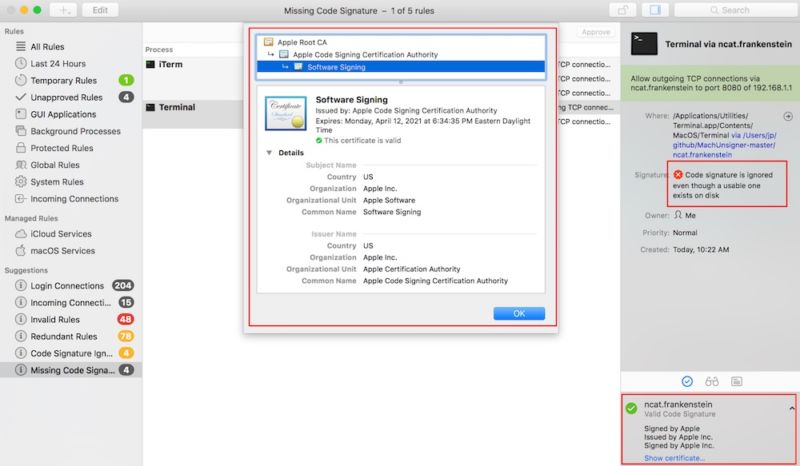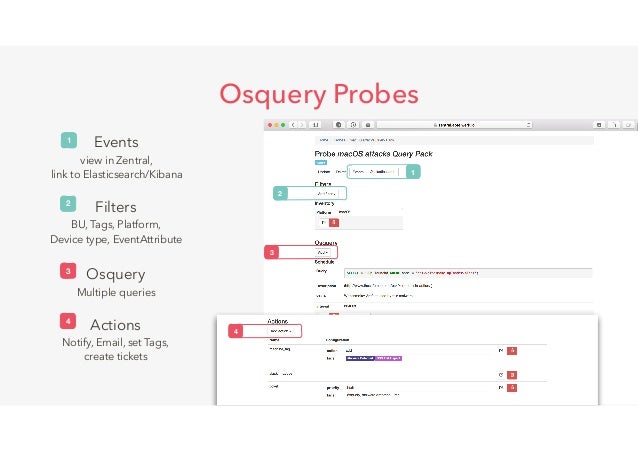
You should also refer to Orbital Yara Rules and System Configuration for more information on how Orbital is configured to work with osquery, for each operating system platform.
#OSQUERY MAC WINDOWS#
WMI Class querying functionality: Refer to Querying Windows endpoints with WMI using Orbital for more information on WMI classes.orbital_powershell_events: This feature will return all stored Powershell Event Logs from the endpoint instead of only returning non-evented Powershell Events.orbital_environment: This feature returns a list of system environment variables configured on the endpoint.However, Orbital has added several of its own custom osquery tables and features to enhance osquery’s functionality. The Orbital-specific variant of osquery has certain features, functions, and tables that have been disabled for security and stability reasons. Differences Between Stock and Orbital’s osquery The results returned through Orbital can be sent to other applications, such as Secure Endpoint™, Secure Malware Analytics™, and Threat Response™, and can be stored in remote data stores (RDS), such as Amazon S3™, Microsoft’s Azure™, and Splunk™.Īll new and updated osquery versions are listed in the Orbital What’s New? topic. There are no package or library dependencies. Each osquery tag (release) builds a macOS package: osquery.io/downloads. You will have to manage and deploy updates. Orbital uses osquery as its query engine and makes use of osquery’s stock tables in addition to Orbital-specific tables. If you plan to manage an enterprise osquery deployment, the easiest installation method is a macOS package installer. This information that can be used for investigation, remediation, and prevention of security threats against the endpoint or endpoints. Each of the endpoint tables represent concepts such as running processes, loaded kernel modules, open network connections, browser plugins, hardware events, file hashes, and more.

It presents the endpoint’s operating system as a high-performance relational database, allowing SQL queries to return detailed, organized operating system data. Osquery is an operating system instrumentation, monitoring, and analytics framework that provides a table-like interface to clients' endpoints. Orbital Yara Rules and System Configuration.If you're interested in learning more about osquery, visit the users guide and browse our RFC-labeled Github issues. Read the launch blog post for background on the project. For more information on finding vulnerabilities in osquery, see a recent blog post about bug-hunting osquery. If you find a security vulnerability in osquery, please submit it via the process outlined on that page and do not file a public issue. Building from sourceīuilding osquery from source is encouraged! Join our developer community by giving us feedback in Github issues or submitting pull requests! Vulnerabilitiesįacebook has a bug bounty program that includes osquery.
#OSQUERY MAC MAC OS X#
This has the distinct advantage of allowing you to monitor your corporate Mac OS X clients the same way you monitor your production Linux servers. For installation information for FreeBSD, which is supported by the osquery community, see the wiki. Even though osquery takes advantage of low-level operating system APIs, you can build and use osquery on Ubuntu, CentOS and Mac OSX.

To best understand the expressiveness that is afforded to you by osquery, consider the following SQL queries:Ĭheck the processes that have a deleted executable: SELECT * FROM processes WHERE on_disk = 0

A variety of tables already exist and more are being written. SQL tables are implemented via a simple plugin and extensions API. With osquery, SQL tables represent abstract concepts such as running processes, loaded kernel modules, open network connections, browser plugins, hardware events or file hashes. This allows you to write SQL-based queries to explore operating system data. Osquery exposes an operating system as a high-performance relational database.


 0 kommentar(er)
0 kommentar(er)
